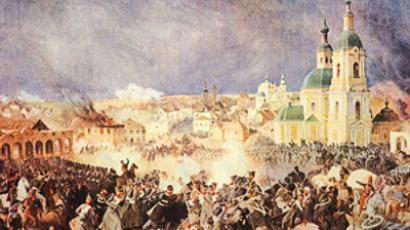Eat pancakes, forgive sins
The traditional Russian festival of “Maslenitsa”, which is dedicated to the end of winter and the beginning of spring, is being celebrated in the country.
Synonymous with pre-Lent merrymaking is the iconic little Russian pancake: the blini. So for Russians it’s time to get the frying pan out.
Maslenitsa is Russia's oldest surviving holiday. Maria Tkachenko and her children love it, mostly because they get to eat blini.
“We like blini and we like cooking them,” Maria's daughter Alisa says. “And we like eating them. And you can add toppings to them.”
Blini are inseparable from Maslenitsa, or pancake week, and its significance, just like a pile of pancakes, has multiple layers.
Originally a pagan festival, Maslenitsa’s roots stretch back as far as the second century AD.
It revolves around the changing seasons, with many revelers burning an effigy of the Lady of Maslenitsa, which represents winter's chill.
“We bake blini for Pancake Week because they are round and golden and resemble the Sun,” Maria Tkachenko says. “This holiday symbolizes the end of winter, and the beginning of the warm spring.”
Its religious significance is considerable. Christian communities all over the world have similar events to prepare for Lent, the traditional forty days of fasting and prayer that ends at Easter.
In Russia it is a time to prepare for the solemnity of what Russians call the great Lent.
Cooking blini is a way to get rid of the dairy products, eggs and fish forbidden in Lent, but in doing so – it's time to live it up a bit.
“Staying in a repentant mood for a long while is quite hard, and so we take this chance to enjoy the festivities our Lord allows us,” says priest Andrey Shumilov. “We are getting ready for fasting and praying, but while we have this little time before Lent we take a chance to enjoy the pleasures of our everyday life.”
Each day of Maslenitsa has a special significance, including sharing blini with your family, your in-laws, and the poor.
The last day of Maslenitsa is forgiveness Sunday, a time when you make sure you are at peace with those around you and begin Lent guilt free.
The food item unites everyone at Maslenitsa, but – as chef Thomas Bluy states – when it comes to blini, Michelin stars are not required.
“I think anyone can make the same blini in a restaurant or at home. The preparation is exactly the same – anyone could be a chef on this day,” Thomas says.
Blini will be on the high end of what's being served this Maslenitsa. They will be served up on millions of tables in homes and in restaurants across Russia. Whether it's waiting for the end of winter, preparing for Lent, or a chance to see friends and family, blini will mean to Russians what they have always meant: a chance for a good feast.













